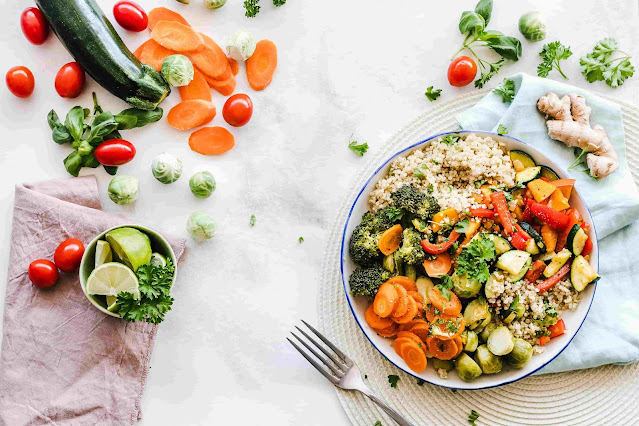10 Healthy Foods That Are Super Healthy
Healthy food is an important part of maintaining a healthy lifestyle. Some foods that are considered to be healthy include fruits, vegetables, whole grains, and lean proteins. These foods provide the body with essential nutrients and can help to reduce the risk of chronic diseases. It's also important to limit the intake of processed and sugary foods, as well as saturated and trans fats. Eating a balanced diet that includes a variety of healthy foods can help to support overall health and wellness.
- Fruits and berries
- Eggs
- Meats
1-6:Fruits and Berries
1)Apple
- Additionally, apples have been shown to have numerous health benefits including improving heart health, lowering cholesterol levels, and promoting healthy digestion. They can also help with weight management due to their low-calorie and high-fiber content.
- Eating apples regularly can also improve brain health and help prevent diseases such as Alzheimer's and Parkinson's. The antioxidants in apples can also help boost the immune system and protect against certain types of cancer.
- In summary, apples are a nutritious and tasty snack that can provide numerous health benefits. So, next time you're looking for a healthy snack, grab an apple!
2)Banana
Here are some other health benefits of bananas:
- Bananas contain antioxidants that help protect against free radicals, which can cause cell damage and contribute to the development of chronic diseases such as cancer and heart disease.
- The fiber in bananas can help promote regular bowel movements, improve gut health, and lower the risk of constipation and other digestive disorders.
- Bananas are a good source of magnesium, which is important for maintaining healthy bones and muscle function.
- The vitamin B6 in bananas can help support brain health and improve mood and cognitive function.
- Bananas are a low-calorie, low-fat food that can help with weight management and promote a healthy weight.
- Bananas are a natural source of electrolytes, which can help prevent dehydration and maintain healthy hydration levels.
- Overall, bananas are a nutritious and versatile fruit that can be enjoyed as a snack, added to smoothies or oatmeal, or used in recipes for sweet or savory dishes.
3)Orange
- Rich in vitamin C and other antioxidants, which can boost the immune system and protect against diseases like cancer and heart disease.
- Contains high levels of fiber, which can support digestive health and help regulate blood sugar levels.
- Can promote healthy skin and hair due to its high vitamin C content.
- May help lower cholesterol levels and improve heart health.
- Can aid in weight loss due to its low calorie and high fiber content.
- May help reduce inflammation and improve overall health.
- Can provide a refreshing and delicious snack or addition to meals.
4)Strawberry
- Strawberries are a good source of vitamins C and K, as well as providing a good amount of fiber and antioxidants.
- They can help boost the immune system, promote healthy skin and hair, and improve heart health.
- Strawberries are low in calories and can help with weight management.
- They may also have anti-inflammatory properties and may help lower the risk of certain diseases such as cancer and diabetes.
- Strawberries are also a good source of folate, which is important for pregnant women and can help prevent birth defects.
5)Raspberry
- High in antioxidants: Raspberries are packed with powerful antioxidants, such as vitamin C and polyphenols, which can help protect the body from harmful free radicals and reduce the risk of chronic diseases.
- Low in calories: One cup of raspberries contains only 64 calories, making them a great choice for weight management and maintaining a healthy weight.
- High in fiber: Raspberries are a good source of dietary fiber, which can help improve digestion, reduce constipation and lower cholesterol levels.
- May improve heart health: The antioxidants in raspberries can help protect against heart disease by reducing inflammation and preventing the build-up of plaque in the arteries.
- May support brain health: The polyphenols in raspberries have been shown to have neuroprotective effects, which may help improve cognitive function and prevent neurodegenerative diseases.
- May reduce the risk of certain cancers: The antioxidants in raspberries have been shown to have anti-inflammatory and anti-carcinogenic properties, which may help prevent the development of certain types of cancer.
- May improve skin health: The vitamin C in raspberries can help improve skin health by boosting collagen production and protecting against UV damage.
- May support bone health: The high levels of manganese in raspberries can help support bone health by promoting bone mineralization and reducing the risk of osteoporosis.
6)Blueberry
- Blueberries are packed with antioxidants and phytochemicals, which help to protect the body from damage caused by free radicals and reduce the risk of chronic diseases.
- Blueberries are a good source of fiber, which can help to promote healthy digestion and regulate bowel movements.
- Blueberries are low in calories and are a good source of vitamins C and K, as well as manganese, which is essential for healthy bones and metabolism.
- Blueberries have been shown to improve cognitive function and memory, making them a great food for maintaining brain health and preventing cognitive decline.
- Blueberries are also a good source of antioxidants and anti-inflammatory compounds, which can help to reduce inflammation and improve overall health.
- Blueberries have been shown to have anti-cancer properties and may help to prevent the growth and spread of cancer cells in the body.
- Blueberries are also high in polyphenols, which have been shown to have anti-aging effects, helping to keep the skin looking young and radiant.
- Blueberries are a delicious and versatile fruit that can be enjoyed in a variety of ways, making them a great addition to any healthy diet.
How to Gain Weight Fast: Tips to Be Safe and Healthy
7)Eggs
- Rich in protein, vitamins, and minerals
- Contain choline, which supports brain health and development
- May improve cholesterol levels and reduce the risk of heart disease
- May support weight loss and muscle building
- May improve eye health due to their high lutein and zeaxanthin content
- Versatile and can be cooked in a variety of ways, making them a convenient and tasty addition to any meal.
8–10: Meats
8)Lean beef
- Lean beef is a rich source of protein, providing essential amino acids that support muscle growth and maintenance.
- It is also a good source of iron, which is essential for carrying oxygen throughout the body.
- Lean beef is low in saturated fat and cholesterol, making it a healthy choice for heart health.
- It also provides a range of other essential nutrients, including B vitamins, zinc, and selenium.
- Consuming lean beef as part of a balanced diet can help to support a healthy weight and body composition.
9)Chicken breasts
- Chicken breasts are a good source of protein, providing around 26 grams per 3-ounce serving.
- They are low in fat and calories, making them an excellent option for weight management and maintaining a healthy diet.
- Chicken breasts are also a good source of essential vitamins and minerals, including vitamin B3, vitamin B6, and selenium.
- They are rich in amino acids, which help build and repair muscle tissue, making them a great option for individuals who are physically active.
- Chicken breasts are versatile and can be cooked in a variety of ways, making them a convenient and easy option for meal planning and preparation.
- They are also easy to store and can be kept frozen for a long time, making them a convenient option for meal planning and preparation.
- Consuming chicken breasts may also support a healthy immune system and cardiovascular health.
10)Lamb
- High protein and nutrient content - lamb is a rich source of protein and essential vitamins and minerals, including iron, zinc, and B vitamins.
- Heart health - lamb is a good source of monounsaturated fats, which can help to lower cholesterol levels and reduce the risk of heart disease.
- Bone health - lamb contains high levels of phosphorus and magnesium, which are important for maintaining strong bones and teeth.
- Digestive health - lamb is a good source of dietary fiber, which can help to promote regular bowel movements and prevent constipation.
- Weight management - lean cuts of lamb are low in fat and calories, making them an ideal choice for those looking to lose or maintain weight.
- Immune system support - lamb is a rich source of selenium, a mineral that is essential for maintaining a healthy immune system.
- Boosts energy levels - lamb is a good source of iron, which is essential for the production of red blood cells and the transport of oxygen around the body, helping to boost energy levels.
- Helps to build and repair muscle - lamb is a rich source of amino acids, the building blocks of protein that are essential for the growth and repair of muscle tissue.
- Delicious and versatile - lamb can be prepared and cooked in a variety of ways, making it a delicious and versatile option for meals.
- Cultural and traditional significance - lamb is an important part of many cultural and traditional cuisines around the world, and is often associated with special occasions and celebrations.







.png)
0 Comments